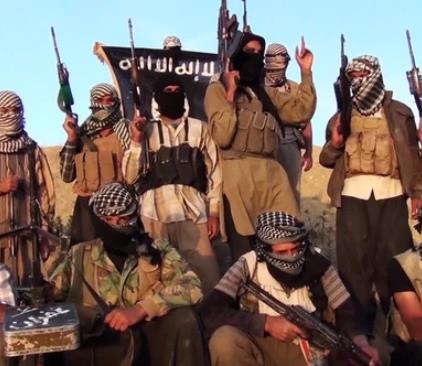Will America’s anti-ISIS bombing campaign succeed?
Tuesday, 23 September 2014
Majid Rafizadeh /Al Arabiya
The United States has shifted its longstanding reluctance to becoming militarily involved in the Syrian conflict. The U.S.-led strikes mark a partial tactical, military and strategic shift in American foreign policy as well as in the foundation of President Obama’s plan for dealing with the Islamic State of Iraq and Syria and the country of Syria.
Despite the fact that the U.S. administration indicated that it will take weeks or months before the U.S. launches its military and bombing campaign against ISIS in Syria, Washington decided to step up and expand its military operations in the Middle East against ISIS. Allegedly without the approval of the Syrian President Bashar a-Assad, the United States has launched strikes at more than a dozen targets in Syria under the control of ISIS.
“U.S.-led strikes have altered ISIS’s former objective of establishing an Islamic Caliphate into fighting with the U.S. and Western allies”
Majid Rafizadeh
The airstrikes in Syria highlight a new American military campaign against ISIS and mark the first time the United States has reportedly used aircrafts, advanced fighter jets, cruise missiles and bombs in Syrian territories after the uprising erupted over three years ago.
High-risk implications
First of all, it is critical to make an argument that without a clear and articulate American agenda against ISIS, Washington is opening a region already engulfed in war to new perilous and high-risk landscapes, as well as to a new phase of regional security risks.
More fundamentally, the Pentagon’s targeted war plan and the American anti-ISIS airstrikes in Syria will not completely eliminate ISIS, but will likely create a deadlock between it and other powers by pushing the militants from ISIS into other areas in the region to find safe haven, specifically to the more populated territories in Syria.
The timing of U.S.-led strikes is critical as well, since it occurs when global leaders are planning to meet at the annual gathering of the United Nations General Assembly in New York. President Obama, who is scheduled to give a speech on the September 24, will likely concentrate on seeking to formulate a global coalition to push for the adoption of a robust resolution against the threat of ISIS.
In terms of these U.S.-led strikes against ISIS, two additional crucial phenomena need to be addressed with regards to American foreign policy. The United States found it necessary to include other partners from the Middle East and NATO in its military campaign in order to gain legitimacy and credibility, as well as to avert any criticism about its unilateral operations or potential imperialistic intentions.
President Obama differentiated between its military campaign against ISIS and the two former American wars in Iraq and Afghanistan by arguing that the administration will not deploy forces on the ground. This language of selective air strikes appears to be a new instrument and tactic to gain popular legitimacy, lessen the domestic concern about Washington’s involvements in wars in the Middle East, and legitimize the use of force, while understating American activities in the region.
In addition, the U.S.-led strikes have altered ISIS’s former objective of establishing an Islamic Caliphate, into fighting with the U.S. and Western allies. As ISIS’s official spokesman and senior official, Syrian-born Sheik Abu Mohammed al-Adnani, stated this week: “If you can kill a disbelieving American or European — especially the spiteful and filthy French — or an Australian, or a Canadian, or any other disbeliever from the disbelievers waging war, including the citizens of the countries that entered into a coalition against the Islamic State, then … kill him in any manner or way however it may be.”
Sovereignty of Syria
On the other hand, a contradiction rises with regards to the American-led strikes in Syria against ISIS. Washington has long been reluctant to intervene in Syria on the premise that Syria’s sovereignty cannot be impeached. The United States has pointed fingers at China and Russia for blocking the United Nations resolutions that could lead to a tougher position towards the Syrian government.
While the Syrian people have experienced one of the largest humanitarian catastrophes in our generation, with hundreds of thousands of people being killed in the Syrian civil war (and while the United States has publicly announced that the Syrian government has utilized chemical weapons against the Syrian people), the U.S. has nevertheless continued its longstanding opposition to militarily intervening in Syria, or to even set up a no fly zone.
The American decision to intervene in Syria changed as soon as Washington’s geopolitical, strategic and economic interests in Iraq were threatened by the remarkable rise and military advances of ISIS.
At this point, President Obama did not hesitate to expand the American military campaign in Syria, even without the unanimous vote from the United Nations Security Council, and without the approval of the United States Congress. Congress had previously deferred the bill, with regards to military strikes against ISIS, to late November of this year. This raises the question of whether geopolitical, economic, and strategic interests do indeed surpass the issue of human rights.
Who is the winner and loser?
The U.S.-led military strikes will likely push the fighters from ISIS to retreat from the territories in their control in Syria, particularly in city of Raqqa. Yet, which forces would fill this power vacuum?
Other oppositional groups, including the Free Syrian Army, are unlikely to be capable of advancing to these territories. This is due to the military superiority of the Assad’s armed and aerial forces. In other words, the territories, which are under the control of ISIS, will likely be recaptured by the Syrian governmental forces.
The U.S.-led military strikes against ISIS in Syria could indirectly assist the Syrian government’s battle against the Syrian oppositional groups, tilting the balance in favor of Assad, and could provide the powerful military push and winning strategy for Damascus.
Finally, from a broader perspective, the military strikes expose the American foreign policy failure when it comes to addressing the crisis in the Middle East, specifically the civil war and humanitarian disaster in Syria. The U.S. claims that it is attempting to block the ISIS’s branch in Syria to resupply fighters to several parts of Iraq and to eliminate their safe haven near the border of Iraq and Syria. Though, if the United States had a clear and articulate foreign policy agenda towards the Syrian civil war from the onset of the crisis, the emergence of such a powerful militant and extremist group would have been inconceivable.
Although President Obama stated that he is “eradicating a cancer,” the dilemma is whether selective military and bombing campaigns are the most efficient resolution. As long as Syria is engulfed in a bloody civil war, and as long as the unrepresentative Iraqi government is dominated by the Shiite coalition, the emergence of such extremist groups will persist.
The United States needs to articulate a clear foreign policy agenda towards the political and security instability in Syria and Iraq. Otherwise, the underlying reasons for the emergence of such extremist groups will remain intact. If the U.S. views a military campaign as the only approach to address such phenomena, Washington would have to sustain a long term military and bombing campaign in the region as well as step up its strikes in the Middle East for a long time to come. This is a long-term challenge which requires a comprehensive strategy beyond solely military campaigns.






















